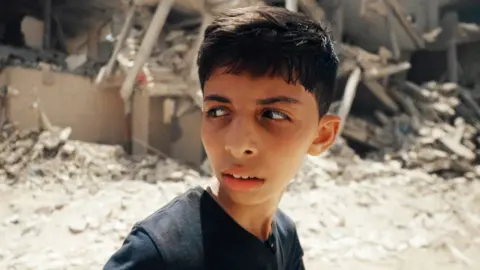
 BBC/Amjad Al Fayoumi/Hoyo Films
BBC/Amjad Al Fayoumi/Hoyo FilmsA BBC documentary about Gaza breached editorial guidelines on accuracy by failing to disclose the narrator was the son of a Hamas official, the corporation’s review has found.
BBC director general Tim Davie commissioned the review into Gaza: How to Survive a War Zone, after it was pulled from iPlayer in February when the boy’s family connections emerged.
The review found that the independent production company, Hoyo Films, bears most of the responsibility for the failure. However, it said the BBC also bears some responsibility.
The BBC said the programme should not have been signed off, and it was taking appropriate action on accountability.
The BBC said it was taking a number of steps to prevent a similar breach being repeated:
- The corporation will create a new leadership role in news documentaries and current affairs. The new director role on the BBC News board, which will be advertised in the next week, will have strategic leadership of its long form output across the news division.
- New editorial guidance will be issued that careful consideration must be given to the use of narrators in the area of contested current affairs programmes, and that the narrator will be subject to a higher level of scrutiny
- A new “first gate” process will be introduced, meaning “no high-risk long form programmes can be formally commissioned until all potential compliance considerations are considered and listed”
The corporation did not name any individuals facing disciplinary action.
Hoyo Films said it took the reviews findings “extremely seriously” and said it “apologises for the mistake that resulted in a breach of the editorial guidelines”.
The company said it was pleased the report had found there was “no evidence of inappropriate influence on the content of the documentary from any third party”.
It said it welcomed the report’s recommendations and “hope they will improve processes and prevent similar problems in the future”.
Hoyo Films said it would work closely with the BBC to explore the possibility of using some material for re-edited and re-versioned shorter films for archive on iPlayer.
The BBC’s director general Tim Davie apologised, saying the report “identifies a significant failing in relation to accuracy”.
“We will now take action on two fronts,” he continued. “Fair, clear and appropriate actions to ensure proper accountability and the immediate implementation of steps to prevent such errors being repeated.”
‘Not appropriate’
The review found three members of the independent production company knew of the father’s position as deputy minister of agriculture in the Hamas-run government in Gaza, but no-one within the BBC knew this at the time.
However, the report criticised the BBC team for not being “sufficiently proactive” with initial editorial checks, and for a “lack of critical oversight” of unanswered or partially answered questions.
The review said it had seen no evidence “to support the suggestion that the narrator’s father or family influenced the content of the programme in any way”.
It added the narrator’s scripted contribution to the programme did not constitute a breach of due impartiality.
However, the report concluded that the use of the child narrator for this programme was “not appropriate”.
A financial examination found that a fee of £795 was was paid for the narrator, paid to his adult sister, an amount which was not “outside the range of what might be reasonable in the context”.
The review was conducted by Peter Johnston, the BBC’s director of editorial complaints and reviews.
The BBC Board said: “Nothing is more important than trust and transparency in our journalism. We welcome the actions the Executive are taking to avoid this failing being repeated in the future.”






